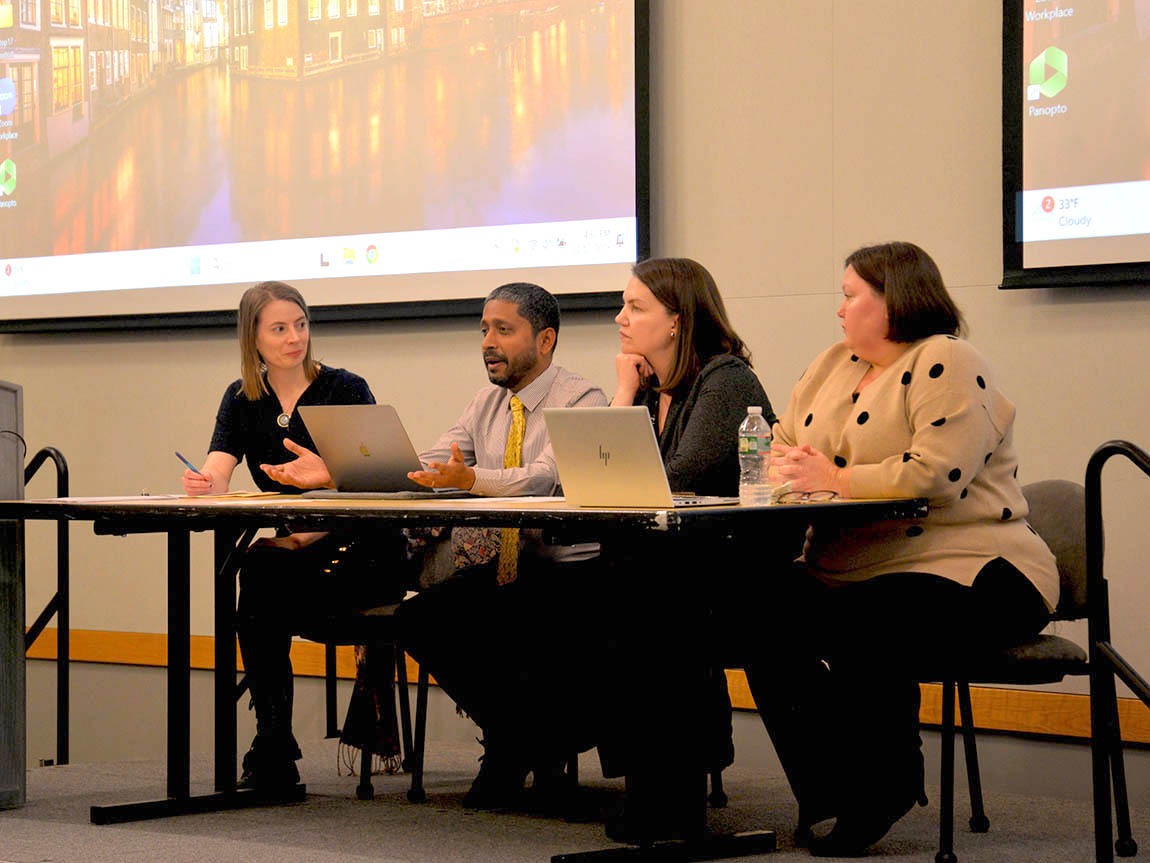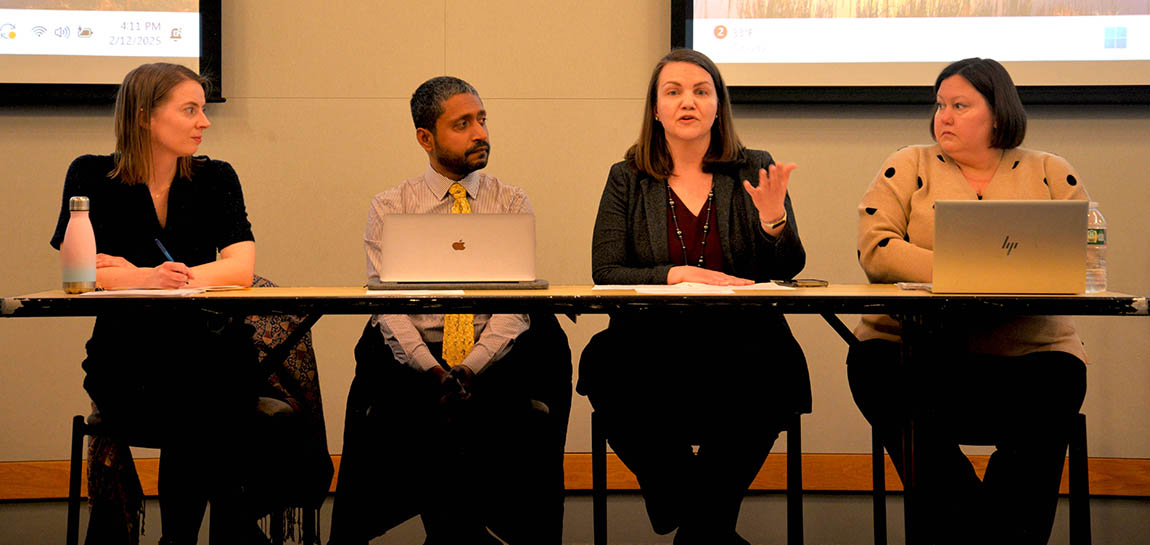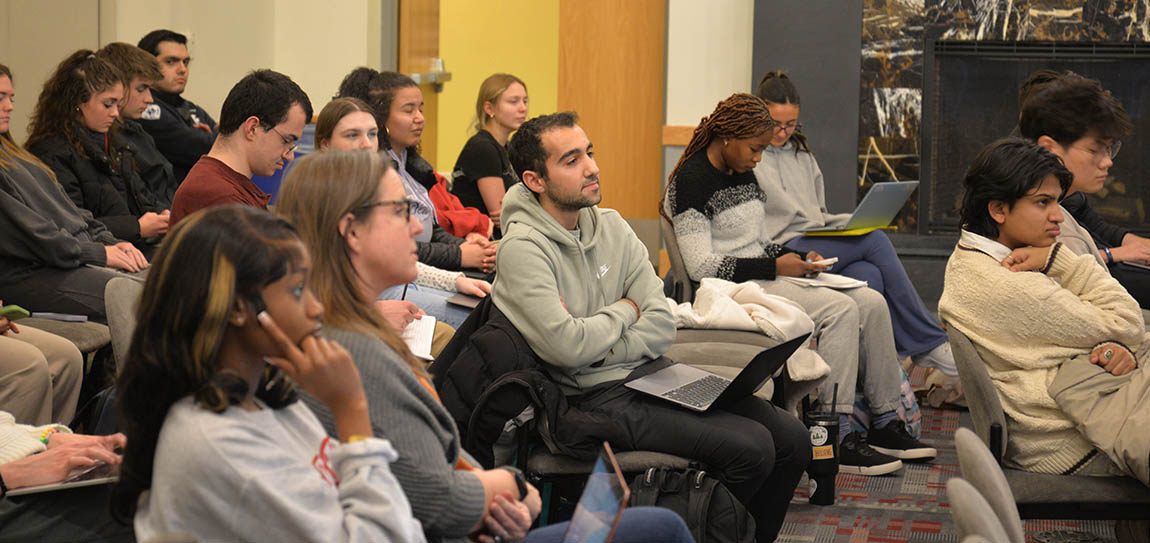Interdisciplinary Faculty Panel Discusses the Funding of Global Health
Faculty from public health, economics, history, and political science gathered to present information on recent executive actions concerning the World Health Organization and U.S. Agency for International Development and to answer audience questions.By: Meghan Kita Tuesday, February 18, 2025 10:28 AM
 Faculty from public health, economics, history, and political science spoke about funding global health. Photos by Charlotte Keefe ’28
Faculty from public health, economics, history, and political science spoke about funding global health. Photos by Charlotte Keefe ’28On Wednesday, a panel of four faculty came together to discuss the implications of President Donald Trump’s executive order to withdraw the United States from the World Health Organization (WHO) and of the freezing of foreign aid and apparent dismantling of the U.S. Agency for International Development (USAID).
Associate Professor of Public Health Kathleen Bachynski opened the panel by noting that nearly every country on the planet is a member of the WHO, with the exception of Liechtenstein, and that USAID is one of the largest official aid agencies in the world.
“Historically, the U.S. has used global health funding and institutions as a way to … exert power on a global stage. ... This really is a moment of rupture and a complete break with the past in terms of how the U.S. has engaged with global health.”
—Assistant Professor of History Sarah Runcie
Assistant Professor of History Sarah Runcie gave an overview of the organizations’ history. The United Nations established the WHO shortly after World War II as part of an international structure meant to encourage global cooperation. President John F. Kennedy established USAID in the 1960s partly to build American influence during the Cold War. The United States has decreased its funding of both organizations over time due to hostility from segments of U.S. politics.
There’s always been a misconception that these organizations are about charity. “Historically, the U.S. has used global health funding and institutions as a way to … exert power on a global stage,” Runcie said, later adding: “This really is a moment of rupture and a complete break with the past in terms of how the U.S. has engaged with global health.”

Runcie speaking on the panel
Assistant Professor of Political Science Lindsay Burt said that many legal scholars believe that it is illegal for a president to withdraw from the WHO without approval from Congress. Congress also holds the power to appropriate funds, so the freezing of foreign aid is also likely to be found illegal. We are also losing opportunities to wield soft power.
“It is a privilege and an opportunity to have a seat at the table,” Burt said, noting that Russia and China are eager to take our place as the leading power in foreign humanitarian assistance. “We do ourselves a disservice by removing ourselves from these spaces.”
“It is a privilege and an opportunity to have a seat at the table. ... We do ourselves a disservice by removing ourselves from these spaces.”
—Assistant Professor of Political Science Lindsay Burt
Associate Professor of Economics Ranajoy Ray-Chaudhuri discussed Special Government Employee Elon Musk’s apparent intent to use elements of a zero-based budgeting model for slashing federal government spending. Musk, the richest person in the world, utilized the model when he bought Twitter. Traditional budgeting uses the previous year’s budget as a starting point, Ray-Chaudhuri explained, while zero-based budgeting builds from nothing and requires every cost to be justified. It is extremely time-intensive and is impractical in a setting as large and complex as the federal government. And, unlike private corporations who try zero-based budgeting, the government cannot declare bankruptcy or cease to provide essential services if it goes wrong.
Bachynski shared that her primary concerns about withdrawal from the WHO include a lack of access to global data, which is what allowed us to develop vaccines quickly during the COVID-19 pandemic and which continues to allow us to update flu and COVID-19 shots annually to match circulating strains.

The destruction of USAID, per a UN AIDS Agency analysis, could lead to a six-fold increase in HIV infections by 2029, “which is just devastating,” she said. “Those are infections that should be prevented.” It will also contribute to starvation, famine, and disease due to associated decreases in immune function. Bachynski co-authored an article in the British Medical Journal about the ethical betrayal inherent in halting medical trials that have already begun.
“Our obligation as health professionals to the safety and welfare of people in health trials is our top priority,” she said, noting that patients in trials need continuous medical monitoring that’s now no longer being funded. “Ethically, [health professionals] may need to violate what the government is telling them to do in order to protect their patients.”
“Our obligation as health professionals to the safety and welfare of people in health trials is our top priority. ... Ethically, [health professionals] may need to violate what the government is telling them to do in order to protect their patients.”
—Associate Professor of Public Health Kathleen Bachynski
During the Q&A portion, the panel discussed the unpopularity of foreign aid among the public, which also completely misunderstands it: Ray-Chaudhuri referred to a poll asking Americans how much they think we spend on foreign aid and how much they think we should spend. Respondents said they think we spend 25% of our budget on it and think we should spend only 10%. In reality, less than 1% of the American budget is spent on foreign aid.
In addition to the destruction of political and humanitarian benefits, freezing foreign aid also has clear domestic consequences, said Runcie. “Thousands of Americans have been placed on administrative leave or lost their jobs,” she said, and food aid provided by USAID has historically been purchased from American farmers. “When is that going to hit? Will it then become a domestic issue?”
